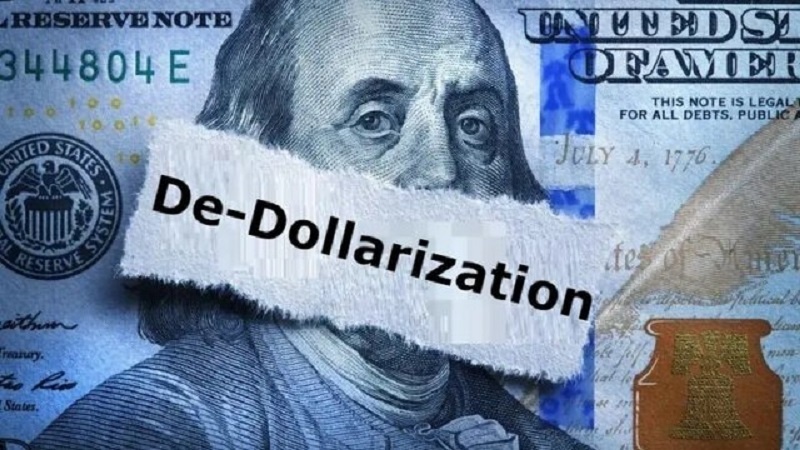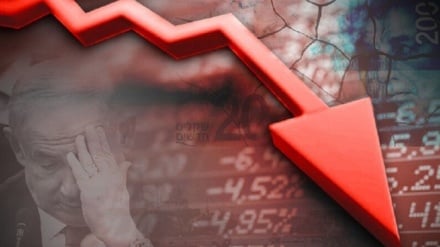De-dollarization an axis for economic impetus and reduction of imposed harms
Pars Today- During the recent years, the policy of de-dollarization has been out on the agenda of some countries, especially those suffering from the US imposed sanctions.
In view of de-dollarization, not only different countries and regional blocs have considered increase of political-commercial dealings and bilateral-multilateral cooperation, but also various unions and organizations, like BRICS, have taken steps in this regard. The Russian President, Vladimir Putin, had said earlier, "The currency used in the dealings is affected by the role of that country in the global economy, and now, a change is taking place because the South World countries form %50 of the global GDP which change the nature of the priorities in using national currencies.
US sanction policies a weapon for dollar's dominance
In fact, the policies of Washington and its allies during the recent years, particularly economic sanctions to pressure other countries to capitulate to the US policies, have increased the motive and will of these countries to reduce and even their dealings with dollar. Thus, presently, a major part of the trade between Russia and China, is being done with Yuan and Ruble. Furthermore, many of the partners of China do their dealings with Yuan.
Stephan Jen, former economist of the International Monetary Fund (IMF) and the American bank "Morgan Stanley" stresses on the issue, "Since February 2020, the speed of change in the global approach to distance from the US dollar has been multiplied 10 times in comparison with the past 15 years."
Welcoming BRICS and proposal for membership of different countries in this economic organization is an example of various countries' inclination to omit dollar in their global dealings. BRICS member states have announced that they are intent to use their national currencies in their dealings and after a while they will replace a common digital currency.
Dollar replaced by digital currency
Different countries are now planning to use a common digital currency which can be a serious threat for dollar.
The digital currency of BRICS can use the Chinese technological power and present an advanced solution in line with digitalization of the global financial affairs. This option facilitates the inter-border dealings and increases trade and economic coherence of member states.
In fact, BRICS currency indicates an intrepid step towards de-dollarization and omission of the US dollar's hegemony in the international trade and financial affairs.
De-dollarization for new order
Christina Georgieva, Managing Director of the IMF, had announced a while ago, "Distancing from the US dollar, as the global currency reserve, is taking place." The remarks of this senior IMF official show that de-dollarization project has become further public and bilateral and multilateral monetary treaties are being spread.
In this respect, Josep Borrell, the foreign policy chief of the EU, acknowledged, "The US has lost its hegemonic situation and the multilateral world order is losing its status after 1945.
Iran and de-dollarization policy
Iran is also among the countries which have welcomed the de-dollarization policy. In view of this, since the beginning of 2024, Iran joined BRICS. The Islamic Republic of Iran's officials have always criticized the sanctions policies of the US and imposition of political and economic pressures on the country. Thus, they have considered de-dollarization as an important solution to decrease the effects of sanctions and create operational ways to enjoy other currencies.
Therefore, one of the ways for de-dollarization is to develop monetary relations with Russia and China and to be active in BRICS.
New opportunities after de-dollarization
It seems that the de-dollarization process is on the rise with the aim of decreasing the US dollar's hegemony and increasing resilience of countries in financial systems, especially that with the increase of economic power of other countries, active players of the global political and economic arenas are changing. Therefore, China, Russia, India, South Africa and other countries will have new opportunities.
Saeed Mohammadi Kavand, expert and researcher of the US issues, writes in this regard, "What can be imagined logically in the first phase is the possibility of turning the global monetary system from a unipolar regime with the axis of the US dollar into a multipolar regime where dollar, Euro, Yuan, and probably some other currencies play an important role.
This will be the greatest change in the global monetary affairs since the disintegration of the Breton Woods system. In such an atmosphere, one can say with certainty that a new political and economic reality has dominated the international system."
Key phrases: weapon of dollar, BRICS, Iran and US, US sanctions
RM/UR



